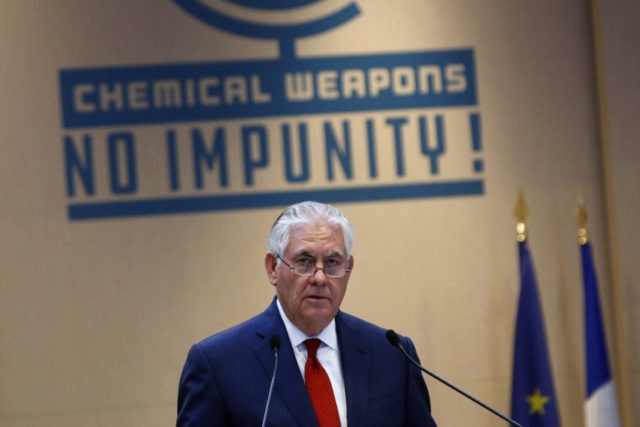Speaking at a conference on chemical weapons in Paris on Tuesday, Secretary of State Rex Tillerson said there is reason to believe Syrian dictator Bashar Assad has resumed using chemical weapons against his own people.
He said Russia was to blame for failing to confiscate all of Assad’s weapons of mass destruction as promised.
Tillerson pointed to a suspected chlorine gas attack conducted Monday on the rebel-held city of Douma in the eastern Damascus suburb of Ghouta as an example of the horrifying effect chemical weapons can have on humans.
“The recent attacks in East Ghouta raise serious concerns that Bashar al-Assad’s Syrian regime may be continuing its use of chemical weapons against its own people,” said Tillerson.
“Whoever conducted the attacks, Russia ultimately bears responsibility for the victims in East Ghouta and countless other Syrians targeted with chemical weapons since Russia became involved in Syria,” he continued, noting that Russia agreed to the verifiable elimination of Syria’s chemical weapons stockpile in 2013. Tillerson said Russia’s responsibility was legally ratified by U.N. Security Council resolutions.
“Russia has not lived up to these commitments,” Tillerson declared. “Since April 2014, there has been mounting evidence that Syria continues to illicitly possess chemical weapons and use them against its own people.”
After reviewing the evidence for the continued use of chemical weapons by the Assad regime, Tillerson harshly criticized Russia’s failure to resolve the issue and questioned Russia’s “continued relevance to the resolution of the overall crisis.”
“At a bare minimum, Russia must stop vetoing and at least abstain from future Security Council votes on this issue,” he said.
“We call on the community of responsible and civilized nations to put the use of chemical weapons to an end. The choice is yours. The people of East Ghouta are watching and the rest of the world is watching as well,” Tillerson concluded.
State Department spokeswoman Heather Nauert supported her boss’ position in a tweet on Monday night:
If Eastern Ghouta was indeed hit by an Assad chemical attack, it would not be the first time. It was hit by a devastating WMD strike in August 2013 employing deadly sarin gas, with casualty estimates ranging from hundreds to thousands.
It was the attack that exposed President Barack Obama’s talk of a “red line” on chemical weapons as meaningless bluster and set the stage for Russia to muscle the Obama administration out of Syria. Then-Secretary of State John Kerry gave copious public assurances in 2014 that Russia succeeded in getting “one hundred percent of the chemical weapons” out of Syria.
Even without gas attacks, conditions in Eastern Ghouta are hellish for the estimated 400,000 civilians trapped there. Russia, Iran, and Turkey declared it a “de-escalation zone” as part of their Syrian peace talks, but Assad stubbornly refuses to lift his siege on one of the last major rebel enclaves in Syria and the one closest to the capital of Damascus. On Tuesday, the BBC published what it described as “shocking footage” of the carnage from almost daily airstrikes and shelling by the Assad regime and its allies.
The pressure will now be on the Trump administration to prove it’s more serious than its predecessor about enforcing a red line against weapons of mass destruction, especially given the new administration’s assertion that a cruise missile attack ordered against a Syrian airbase by President Trump in April intimidated Assad out of using WMD.
The point of the Paris conference was to establish that Russian duplicity might have made them untrustworthy partners for disarming their client states, but the rest of the civilized world will stand resolutely together against weapons of mass destruction.
“Those who carry out chemical weapons attacks need to be made aware that we know who they are, and we will go after them,” vowed French Foreign Minister Jean-Yves Le Drian on Tuesday, as his government announced it will freeze the assets of companies suspected of providing materials to Syria’s WMD laboratories.

COMMENTS
Please let us know if you're having issues with commenting.